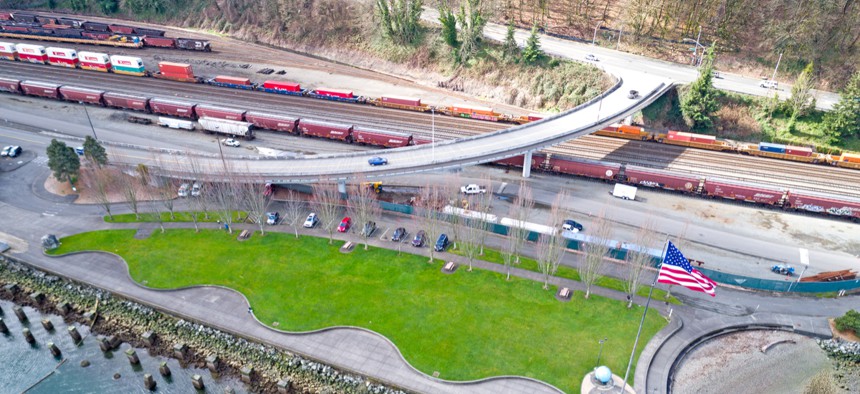Maryland Congressman: It’s a Mistake Not to Pair Infrastructure With Tax Overhaul

The BNSF freight rail tracks near the Port of Tacoma in Washington state. Shutterstock

Connecting state and local government leaders
Meanwhile, discussions continue in the infrastructure community about the promise and limitations of public-private partnerships.
WASHINGTON — Lawmakers are making a mistake by not combining the tax rewrite effort in Congress with a significant infrastructure investment package, a Democratic congressman suggested here Thursday.
“If you make a decision to move forward with tax reform and you specifically decide not to include infrastructure in that tax reform, you are almost definitionally acknowledging that you have no serious intention of doing infrastructure,” said U.S. Rep. John Delaney, of Maryland.
“There’s really going to be no way of paying for it in the future,” he added. “Unless we introduce some new source of revenues.”
Delaney made his comments Thursday morning at a forum held by the Progressive Policy Institute and Common Good.
Later in the day, the U.S. House passed major tax legislation with only Republican support. And the Senate Finance Committee continued to debate a GOP-backed tax measure of its own.
The Trump administration, meanwhile, has indicated that one of its leading priorities, along with the tax code revamp, is a major infrastructure investment program. But the administration has yet to reveal a formal proposal for how they’d like that program to look.
From Delaney’s perspective, the tax overhaul could use federal revenue produced from changes to the corporate tax code, specifically for businesses with overseas interests, to boost infrastructure spending. He said legislation he has introduced “basically launches a trillion dollar infrastructure program” and that “it’s fully paid for by pairing it with the international tax reform.”
Perspectives on P3s
Jeremy Ebie, CEO of Phoenix Infrastructure Group, who also spoke at Thursday’s event, noted that increasing pressure on government finances from sources like pensions and health care is making it difficult for U.S. states and localities to fund infrastructure.
“I don’t see how the government, on any level, is going to continue to finance infrastructure, period, as well as they did back when,” he said.
Private capital, in his view, will be important going forward.
“There’s about $150 billion sitting on the sidelines, of dry powder, for investment in infrastructure. For U.S. infrastructure,” Ebie said.
He explained that this money is held by pension funds, insurance companies and other investors.
But John Porcari, a former deputy secretary at the U.S. Department of Transportation, who now directs consulting services for the firm WSP USA, highlighted an obstacle he sees with infusing more private money into public infrastructure deals.
“The single biggest problem in public-private partnerships is, in the U.S., you can’t price the political risk,” he said. “Every local jurisdiction, every regional jurisdiction, every state does it differently.”
This can create problems, Porcari added, when state or local governments block deals at the last minute, when a private entity has spent millions of dollars on a proposed project.
A fix, according to Porcari, would be for the federal government to require jurisdictions accessing federal loan programs to have a “defined process” for approving projects. “Where you can say ‘no,’” he said. “But you can’t say ‘no’ at the 11th hour and 59th minute.”
Ebie and Porcari both highlighted tax-exempt private activity bonds as a crucial tool for financing public-private partnership, or P3, deals.
The income tax exemption for interest earned from the bonds would be eliminated under the tax bill that the House passed Thursday. But it’s maintained in the Senate tax proposal.
“It’s critical that they keep that,” Ebie said. “That’s how P3s get done.”
Bill Lucia is a Senior Reporter for Government Executive’s Route Fifty and is based in Washington, D.C.

NEXT STORY: Seattle Expects to Save Millions of Dollars Through Right-of-Way Management





